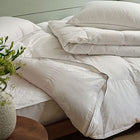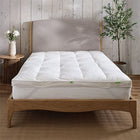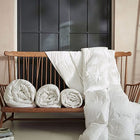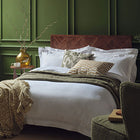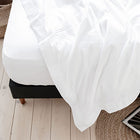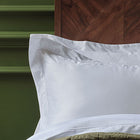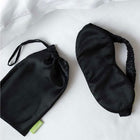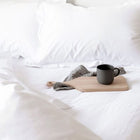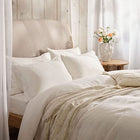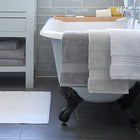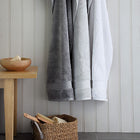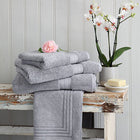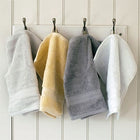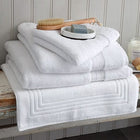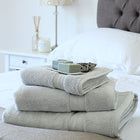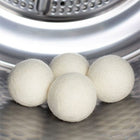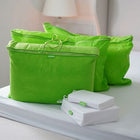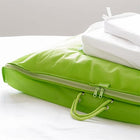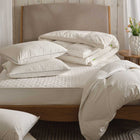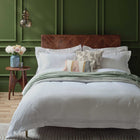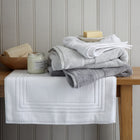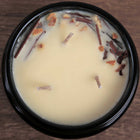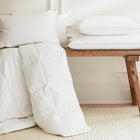Guide to mattress protectors
A good quality mattress protector can play an essential role in keeping your mattress in optimal condition. Here we explain why investing in a protector is so important and the key ingredients that determine a mattress protector’s quality.
Keep reading or jump straight to:
- What is a mattress protector?
- What is the difference between a mattress protector and a mattress cover?
- Is it worth getting a mattress protector?
- Can you machine wash a mattress protector?
- Synthetic or natural, which is the best mattress protector?
- What about waterproof mattress protectors?
- What is a mattress encasement?
- What size mattress protector should I buy?
- Can you use an electric blanket with a mattress protector?
- Do mattress protectors protect against bed bugs?
- Do mattress protectors make a bed more comfortable?
- Why are some protectors noisy?
- What about pillow protectors?
- What to look for when buying a mattress protector - the 6 main requirements.
What is a mattress protector?
A mattress protector is a piece of bedding that sits on top of your mattress, like a second skin, but beneath your fitted sheet.
Fully removable and washable, a mattress protector is intended to keep your mattress clean by minimising contamination from fluids, skin and hair, all of which can stain your mattress and degrade its quality.
Mattress protectors can also help you to achieve a better night’s sleep if you’re someone who suffers from asthma, eczema or dust mite allergies, by providing an extra layer of protection between your mattress and your bedding. And if you're a hot and sweaty sleeper, it can provide a sweat wicking layer.
What is the difference between a mattress protector and a mattress cover?
There is no difference. A mattress cover is simply another way of referring to a mattress protector. Both 'mattress protector' and 'mattress cover' serve the same purpose: to provide a protective layer that helps to keep your mattress fresh, clean and unsoiled.
You may also come across the term 'mattress pad' in your search for mattress protectors. This is a similar product to a protector or a cover. A mattress pad (as the name implies) is a padded layer that sits atop your mattress in order to add additional comfort.
Is it worth getting a mattress protector?
If you’re wondering; should I get a mattress protector, the answer is yes. A quality mattress is an investment and how long it will last depends entirely on the aftercare you give it.
A fitted sheet or bottom sheet simply isn’t enough to protect your mattress from the many contaminants it comes into contact with each night. Many people aren’t aware but the average adult releases around 100 litres of sweat per year whilst asleep, all of which can seep into your mattress if not protected.
As damp and moist conditions attract dust mites, not protecting your mattress also increases the risk of an infestation of these microscopic sized bugs, the faeces of which can cause nasal congestion, coughing and itchy skin. These can make it problematic to achieve a good night’s sleep, something which is essential for our health.
Can you machine wash a mattress protector?
Yes. Investing in a mattress protector would be pointless if you were unable to wash it and keep it clean. For this reason, you’ll find mattress protectors and pillow protectors are suitable for machine washing at home. Just be sure to always carefully follow the washing instructions when doing so and likewise with tumble drying too.
Synthetic or natural, which is the best mattress protector?
You’ll find mattress protectors and pillow protectors available in a choice of synthetic or natural fabrics. If you’re looking for quality - and we’d argue this is vitally important when protecting a mattress - we’d always advocate spending a little more and going the natural route.
Opt for a 100% pure cotton mattress protector which is naturally breathable and sweat wicking. A breathable mattress protector will help to keep your body temperature perfectly regulated at night so you don’t sweat excessively and experience issues with wakefulness as a consequence of being too hot or too cold.
A natural cotton mattress protector will also help to limit moisture from making your mattress damp, thereby reducing the risk of a dust mite infestation, which can lead to far greater health complications and difficulties sleeping.
Make sure it's really cotton: Some bedding brands offer a "Cotton" mattress protector that isn't filled with pure cotton or comes with a synthetic skirt. If you want to choose a natural 100% cotton mattress protector, check the product details carefully.
What about waterproof protectors?
As the name implies, a waterproof mattress protector provides a waterproof barrier between you and your mattress. Waterproof protectors are made from synthetic materials so they may not be very breathable and can be noisy when you move around the bed. A waterproof mattress protector can be useful for sleepers with incontinence, bed wetting or similar issues.
What is a mattress encasement?
A mattress encasement is a mattress protector that surrounds the mattress on all sides. It typically comes with a zip enclosure and helps protect against bed bugs and allergens.
What size mattress protector should I buy?
You’ll find mattress protectors in each of the standard mattress sizes on sale: single, double, king, and super king. You should be purchasing the size that aligns with your mattress size, so it fits comfortably and isn’t in danger of dislodging. See our mattress protector size guide.
Can you use an electric blanket with a mattress protector?
Yes, modern electric blankets can be used with a mattress protector. However, always check your electric blanket manufactures instructions for specific guidelines. The Scooms luxury mattress protectors are generously filled, so we suggest they go underneath your electric blanket so that you get the maximum warmth from your blanket.
Do protectors protect against bed bugs?
Bed bugs can live on mattresses and other dark hiding places such as furniture and carpets. Most protectors go over the top and sides of your mattress so won’t fully protect it from bugs. Though a barrier between you and your mattress can help.
Do mattress protectors make a bed more comfortable?
A softly cushioned mattress protector will add a layer of comfort on top of your mattress like the Scooms protector. As our protector is made from breathable cotton, it also adds a sweat wicking layer on top of the mattress to help hot sleepers sleep more easily.
Why are some protectors noisy?
Mattress protectors that are constructed from synthetic or man-made materials can be noisy or rustle when you move. You won’t hear a crinkle from the Scooms super soft all cotton protector.
What about pillow protectors?
Similar to a mattress protector, a pillow protector is a removable fabric casing that fits around your pillow to provide an additional layer that sits between your pillowcases and your pillows.
Like a mattress protector, a pillow protector can play a key role in preventing oils and other moisture from sources such as skin and hair from penetrating your pillows and causing unsightly stains and odours that can permanently damage your pillows.
However, be aware that pillow protectors can often be too tight for a good quality natural pillow like the Scooms Hungarian goose down and feather pillow. You want your pillow to be able to breathe and for the filling to have the ability to evenly redistribute when plumped and shaken. A pillow protector can inhibit the pillow's natural loft and can also trap in moisture by limiting the pillow’s breathability. Avoid forcing your pillows into a protector and make sure you don’t struggle to get them zipped up when they are fitted. Unlike a mattress, a pillow is machine washable so it's not an essential addition to your bedding.
If you do choose to use a pillow protector, also make sure it is made from a breathable material like 100% cotton. If you don't choose to use a pillow protector, make sure you wash your pillowcases once a week to keep your pillows fresh and wash your pillows carefully once every six months.
What to look for when buying a protector
The best mattress protector to buy meets these 6 main requirements:
• Fit – It should be just the right size for your mattress, covering it completely.
• Breathability – Cotton is the most breathable material for a protector.
• Natural Materials – Choose natural materials like 100% pure cotton rather than petrochemical derived materials such as nylon and polyester.
• Easy To Wash - Don't pick a protector that needs to be dry cleaned.
• Oeko-Tex 100 Standard Certified – Tested against harmful chemicals & toxins.
• Environmentally Friendly Packaging - Plastic free, reusable or recyclable packaging.
Found our protector guide helpful?
If you’ve found the advice on this page beneficial and insightful, take at look at some of our other bedding buying guides, including How to choose a new mattress and our Hungarian goose down duvet guide.
Mattress protector FAQs:
Why do you need a mattress protector?Mattress protectors are designed to keep your mattress protected from bodily fluids, staining, spills and general usage. Are mattress protectors worth it?Yes, it is worth protecting your mattress, which is your most expensive bedding item, with an easily washable layer so that your mattress stays in great condition. Does a mattress protector go under a sheet?Yes, a mattress protector fits underneath your sheet, on top of your mattress. Which mattress protector is best for cooling you as you sleep?A naturally breathable mattress protector will help keep you cool as you sleep. Look for a 100% cotton mattress protector which is breathable and sweat wicking. |
